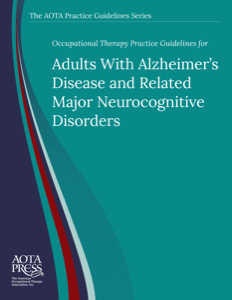Abstract
Alzheimer’s disease is the 6th-leading cause of death in the United States, 5th among adults ages 65 or older. It is the only disorder among the top 10 causes of death that cannot, at present, be prevented, cured, or slowed. The total cost of care is expected to exceed $1 trillion annually, before adjusting for inflation, in 2050.
People with Alzheimer’s disease and related major neurocognitive disorders and their caregivers face significant challenges that can reduce their quality of life. Occupational therapy practitioners can alleviate some of these challenges through evidence-based interventions that optimize occupational performance and safety, reduce problematic behaviors, educate and support caregivers, and promote well-being both for people with major NCDs and for their caregivers. Topics include occupations, behavior, perception, falls, and caregiver strategies.
This Practice Guideline serves as a resource for practitioners to find evidence-based interventions for clients with major NCDs, provides a tool for advocacy with external audiences, and highlights areas for future research and inquiry. Case studies and an assessment table provide in-depth, practical information, and evidence tables are included on a flash drive for ease of searching.
Details
Table of Contents
Occupational Therapy Practice Guidelines for Adults with Alzheimer's Disease and Related Major NCDs
-
Front Matter
i2

- 1. Overview of Alzheimer’s Diseaseand Related Major Neurocognitive Disorders 124
- 2. Best Practice and Summaries of Evidence 528
- 3. Interventions That Address Occupations 730
- 4. Environment-BasedInterventions 1134
- 5. Interventions That Address Caregiver Strategies 1740
- 6. Implications of theEvidence for Occupational Therapy Practice, Education, and Research 2346
- References 2952
-
Appendix A. Preparation and Qualifications of Occupational Therapists and Occupational Therapy Assistants
4770

-
Appendix B. Domain and Process of Occupational Therapy
4972

-
Appendix C. Occupational Therapy Process for Adults With Alzheimer’s Diseaseand Related Major Neurocognitive Disorders and Their Caregivers
5376

-
Appendix D. Sample ICD–10–CM Codes for Occupational Therapy Evaluationsand Interventions for Adults With Alzheimer’s Disease and RelatedMajor Neurocognitive Disorders
7396

-
Appendix E. Selected CPT® Codes
7598

-
Appendix F. Evidence-Based Practice
79102

-
Appendix G. Evidence Tables and Risk-of-Bias Tables
83106

- Table G.1. Evidence for the Effectiveness of Interventions Designed to Establish, Modify, and Maintain ADLs, IADLs, Leisure, and Social Participation for People With Major NCDs 85108
- Table G.2. Risk-of-Bias Analysis for Included Studies: Evidence for the Effectiveness of Interventions Designed to Establish, Modify, and Maintain ADLs, IADLs, Leisure, and Social Participation for People With Major NCDs 104127
- Table G.3. Risk-of-Bias Analysis for Included Systematic Reviews: Evidence for the Effectiveness of Interventions Designed to Establish, Modify, and Maintain ADLs, IADLs, Leisure, and Social Participation for People With Major NCDs 108131
- Table G.4. Evidence for the Effectiveness of Environment-Based Interventions on Behavior, Perception, and Falls in Both the Home and Other Settings forPeople With Major NCDs 110133
- Table G.5. Risk-of-Bias Analysis for Included Studies: Evidence for the Effectiveness of Environment-Based Interventions on Behavior, Perception, and Falls in Both the Home and Other Settings for People With Major NCDs 130153
- Table G.6. Risk-of-Bias Analysis for Included Systematic Reviews: Evidence for the Effectiveness of Environment-Based Interventions on Behavior, Perception, and Falls in Both the Home and Other Settings for People With Major NCDs 131154
- Table G.7. Evidence for the Effectiveness of Educational and Supportive Strategies for Caregivers of People With Major NCDs on the Ability to Maintain Participation in That Role 132155
- Table G.8. Risk-of-Bias Analysis for Included Studies: Evidence for the Effectiveness of Educational and Supportive Strategies for Caregivers of People With Major NCDs on the Ability to Maintain Participation in That Role 151174
- Table G.9. Risk-of-Bias Analysis for Included Systematic Reviews: Evidence for the Effectiveness of Educational and Supportive Strategies for Caregivers of People With Major NCDs on the Ability to Maintain Participation in That Role 154177
